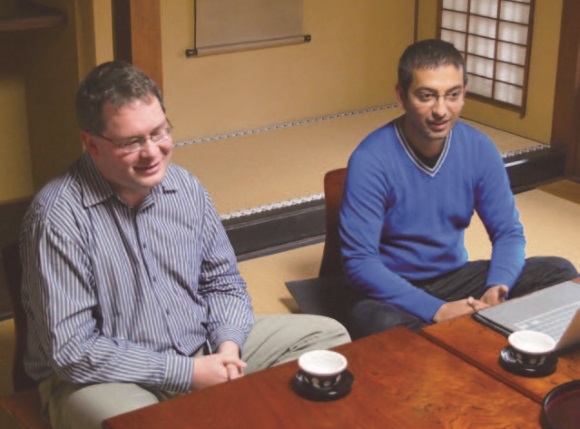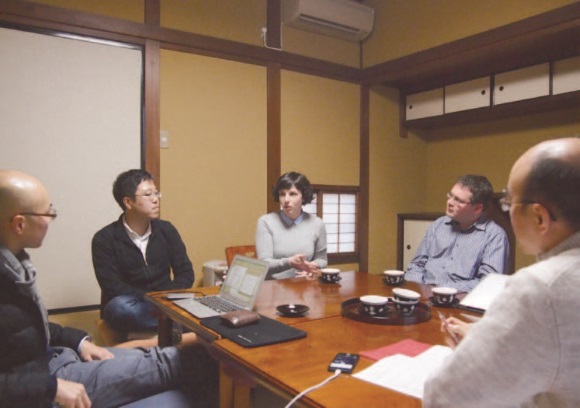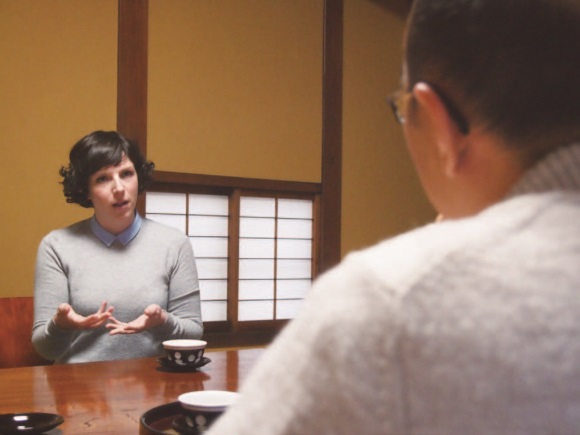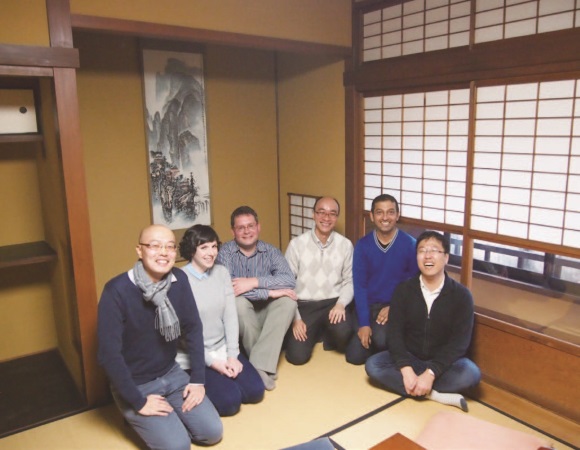シリーズ白眉対談10「Truth」(2016)
(Mak) I think we cannot really avoid this question of ethics, because in academia, scholars are looked up to as the custodian of knowledge, and thereby, also the so-called truth.
(Coates) Before we go in the direction of ethics, I think this is something that we should consider — whether things like texts and dominant narrative should be recognized as truth? I think this is really important when we talk about whether we can be custodians of knowledge, or whether there should be custodians of knowledge. In history, one of the problems there is that we tend to privilege textual sources over vocal sources – narrative. We’ve been talking about voices, but really we’re talking about voices on the page.Another thing that we don’t recognize are divergent narratives. Narratives that involve language that we’re not used to. Some of the work that I do is related to the “comfort women” issue, with traumatic narratives, that are not repeatable, and often do not seem logical. There is now an interesting question facing the academics in my field: How can we make space for people to represent themselves in their own voices? How can we, at the same time, encourage the audiences of those testimonies to recognize what they’re hearing, even though it doesn’t sound, or it doesn’t look, like quite what they’re used to recognizing as truth.
(Higuchi) It’s because those who provide testimonies have their own versions of truth and stories. That’s why it’s difficult for the narrator to represent himself…
(Christian) But this is not the interpretation of the testimony, right? It is about how you assemble the texts or documents in the first place, no?
(Higuchi) But that takes us back to the problem of authority. As an academic, I can insist that my way is more impartial and objective. But, that objective approach cannot really capture the real experience of it. It is a problem; we can’t just claim that we historians know best.
(Coates) I think that maps onto some of the issues in the sciences about provability and absences, right?
(Christian) That’s right. In the sciences, we are interested in fundamental theories, which make a statement about an infinite number of instances, which you can never possibly test empirically. But one counter- example is enough to disprove a universal statement. Therefore the common wisdom in the sciences is that a theory should be posed in such a way that it can be falsified. But in reality that is not always the case. There is always a hard core in science which is kept by the convention of the community as the immutable part.
(Poudyal) With the life sciences, we are now moving into a phase where we consider truth as constant. There is no question there. At this point in time, with what I have, this is my interpretation.
(Mak) It sounds like what you hear when you go to the doctor. This is the best I can do for you.
(Laughs) We have been talking about the issue of authority and how that may affect the way truths are presented. How does that apply to you?
(Poudyal) If you put a strong hierarchy with authority and a custodian of knowledge together, you tend to have that very rigid system that we currently have. All life sciences have this structure of experts. That automatically leads to the scenario where you have strong authority for everything, for all disciplines within the big discipline.
(Higuchi) Medicine, historically speaking, started out as an art. So, it is no wonder medicine still tends to be very hierarchical and authoritative. Medical doctors can make some general statements as the truth, but at the same time, it wouldn’t solve your ultimate problem, which is how to save the patient. So that’s where the authority and trust really come in. It’s just one event, not repeatable.
(Mak) How about in the case of the religious texts? As the authority from an academic point-of-view, how do you deal with those with the background of religious authority?
(Okita) There could be conflict. You need to be mature enough to deal with it. Being young in certain contexts is in itself a lack of authority. You have to treat those with religious authority respectfully even if what they say contradicts the academic view…
(Mak) So would you tolerate in silence?
(Okita) You don’t need to contest each and every issue. We need to recognize that academic authority and religious authority rest in different epistemology. The former is based on empiricism and the latter on religious scripture, the words of saintly figures and so on. Recognizing this difference would allow us to respect each other’s perspective.
(Mak) Let us look at the other side of the story – the untruth. So far we have been talking about different forms of authority which may affect our presentation of the truth. As publicly funded academics or more generally, as public intellectuals, we are obliged to bring to the public what we believe to be true. How do you then deal with the untruths in your field?
(Poudyal) If I say, this drug will help people lose weight, it will be a hit in the market. Maybe I gathered that evidence from an experiment on a lab rat. There is still a long way to go from that to human studies. The information is clearly untrue by the time the information is applied in somebody’s kitchen. But I did not intend to give that message to start with. It was partial evidence. It takes responsibility as academics to point these things out. It’s more of an interpretation.

(Okita) But is there complete evidence? Isn’t evidence always partial? The question is: when is our evidence good enough for public presentation, say in the form of publication? With the pressure to produce results we might sometimes struggle with our temptation to publish with pre-mature evidence. Have we not all experienced this? In Japan, we had this Obokata case. Why did that happen at all? A researcher told me that in life science, there seems to be more ambiguity, and therefore, more scope for interpretation.
(Poudyal) True. But with that particular case, the experiment appeared to be unintentionally flawed.
(Christian) There are cases in the experimental sciences of deliberate fraud… In the theoretical sciences, it’s not so much of a problem since the published paper is the complete record.
(Higuchi) Cold fusion is a very interesting example. Back in the Hakubi Dialogue 1980’s, there were scientists claiming that they could induce fusion reactions at a much colder temperature. In the end, no one could replicate it. When it comes to science, it gives more leeway to experiments in terms of catching flaws. I think the dif ference between the physics case and the Obokata case is how closed, exclusive the research community is. For Obokata, it has a lot to do with the first authorship, the patent and so on. At around the same time, a similar thing in experimental physics could have been a scandal, i.e., the discovery of something faster than the speed of light. But, it was not a scandal, because the data was open. Everybody just jumped at it, and tried to figure out if it is true or not.
(Mak) That shows how, institutionally, openness is an important criterion for the truth to come out.
(Christian) I think the point that Higuchi raised is also interesting from another point of view because it shows that scientists are sometimes pushed toward publishing before their work is actually ready to be published. I think this is partly because of this trend of economization of academia that talks about consuming knowledge, and asks for measurable results.
(Higuchi) I think everyone has that tension. You would like to have more evidence or sources examined, but in order to make sure that this paper is published before the end of a certain fiscal year, you just have to go with what you have.
(Mak) Wouldn’t you think that working in such environments, the researchers would be prone to produce rather shaky works, with the partial truth or even untruth that we were talking about?
(Higuchi) The hyper-pressure, hyper – speed academic environment, is not how the academics should be to begin with.
(Okita) It seems to me that it was because the system of evaluation has adopted more of a business model; partly also because it’s difficult to judge the quality of some papers. As a result, especially for the younger researchers the number of their publications may become more significant than their quality.
(Christian) Speaking of quality, it often isn’t easy to say what the impact of the paper would be. In the mathematical sciences sometimes a paper might be decades old, and is then found to be relevant later for an important theory.
(Okita) Exactly, but in the meantime, we have to survive and get acknowledged. We may not be able to wait until your theory is discovered, and praised, after you’re dead.
(Poudyal) I suppose we just have to work with the business model without affecting the quality of our research. With this amount of money, and this amount of time, I can achieve what I can and continue. In the context of truth, my hypothesis is this: it’s true or false, right? That becomes a dynamic concept, and might change, update every five years. As long as we maintain the continuity, we should be fine. The issues Higuchi described arise only if you cannot maintain such continuity in your work.
(Mak) When you produce your research results, do you always have that continuity in mind? Or do you worry who is going to use it, or how it is going to contribute to your field? In humanities, researchers are always accused of producing something that no one cares about, and that has no impact on society. Do the scientists not succumb to this kind of utilitarianism critique?
(Poudyal) I think it’s very tricky nowadays because the research data is easily accessible. It’s very important how you word your results because that information goes to a lot of people. We have to be responsible, keeping in mind how the media is going to take this result, especially because this can have a lot of health impacts for people.
The biggest thing at the back of my head used to be, at one point, “How will this get me the next grant?” But now it’s more like, “How will this be perceived by somebody who is interpreting my work?”
(Christian) Would you be held personally responsible?
(Poudyal) No, nobody cares.(Laughs) They wouldn’t even see my name on the paper, but as scientists, I think it’s part of our responsibility.
(Okita) These issues with the consumption and social impact of truths may not be so relevant to the scientists who work mostly with theories. In some cases, they may be closer to humanities…
(Mak) In terms of relevance, or irrelevance!(Laughs)

(Christian) The immediate impact of theoretical science is, of course, marginal, but the ultimate impact might be huge, and an example from history is electromagnetism. In the early 19th century, electromagnetism was a very academic pursuit; it was used in the fair grounds to show interesting experiments like arcs of light, and so on; but afterwards Maxwell unified and thus created the theory of electromagnetism. Where would our society, nowadays, be without electromagnetism?
(Mak) Even in humanities, obscure ideas may end up having a huge impact on society. Look at communism or how the Nazis appropriated the Aryan theory and turned it into their ideology. But let us return to the topic of truths and our roles as researchers. For example, what Coates was saying about this issue with the “comfort women”. How do you feel about your role when you produce a paper on this topic? Are there wrongs in history that are going to be righted by your work? Will you present the truth even if it may offend some people?
(Coates) As Toshi [Higuchi] said, you’re always trying to think about how to represent perspectives that are not represented in the academy, and by the political elite. In the case of the “comfort women”, academics are definitely trying to right some historical wrongs; but really when you’re talking about oral histories and personal testimony, there can’t really be a concept of untruth because memories are fluid. I think the format in which you disseminate your findings from oral history is becoming increasingly important because oral history and personal testimony can’t stand up against bureaucratic paperwork or text on the same basis.
(Mak) Presenting one’s views through appropriate medium and manner is always important. We should definitely avoid any kind of misrepresentation as that could lead to unnecessary dispute. However, there are sometimes conflicts of interests which we cannot avoid when we present the unpleasant truth. As academics do you feel that taboos and such problem areas are an issue in your research?
(Okita) In my current research, I do deal with the very sensitive issue of sexuality in Hindu tradition. The lay Hindu people are sometimes annoyed by certain parts of my work, which examine God’s sexuality.
(Mak) What made you interested in this subject in the first place?
(Okita) To put it very simply, I think there are certain aspects of Hindu traditions that need to be addressed, and discussed, which has been swept away partly because of their colonial legacy.
(Mak) My research on the transmission and exchange of historical sciences has a lot to do with ancient cultures and the contact among them. Most people would like to think: this is Chinese, this is Indian, this is Greek; or this is “ours” and “others” have no right to talk about this. In reality, culture and identity are much more fluid than what most people think. I am often surprised to see how some academics may become very emotional when it comes to the issue of cultural identities, particularly their own. Nowadays we have a more much more dynamic kind of intercultural dialogue than before, though academic chauvinism can still be felt in certain circles from time to time. I feel that I would get into this kind of controversy precisely to make people think about these issues, to challenge people’s mindsets. Who are the Asians, who are the Japanese, or Chinese?
(Poudyal) I think it has also to do with what stage in your research career you are in because at the moment I think we can afford to take a few risks, and work on controversial subjects.
(Mak) This is a very rare and privileged time that we have.
(Poudyal) Absolutely, and I think we should make the most of it, and I’m very happy doing that. Medical science is very commercialized now, and we’ve got a lot of pressure from the industry or funding agencies to present your evidence in a different light. I try to differentiate between being very brave because I’m young, and I can take a few risks, and speak the truth.
(Christian) The same is true for the physical sciences and my work.
(Coates) In the humanities, basically you’re always interrogating society’s dominant fantasies. In the process, you’re going to make controversy because the dominant fantasy is dominant for a reason. It provides something that makes it easier for people to live, and to order their worlds. People get very angry because that’s something that they have structured their life around.

(Higuchi) As a good historian, I never really start off seeking a controversy, but the controversy catches me later. When I started my research on radioactive fallout in 2000, no one really cared; but once the Fukushima accident happened, everybody started asking what I’m doing because one of the main parts of my story is about low-dose radiation, which is of course as controversial as anything could be. The interesting thing is I always feel a bit of distance from what’s going on in Japan. I feel more like an extraterrestrial alien coming from another planet called the United States.
(Mak) In a way you’re in a privileged position because you have access to different perspectives, isn’t it?
(Okita) I guess also part of the issue is that you are, after all, Japanese; so the Japanese audience expected you to be supportive.
(Higuchi) It is both good and bad. The bad thing is that I’m not an insider. So, I have to be aware not to of fend the people actually affected by the situation. It doesn’t make me timid, however, because I do think if there’s a controversy, there should be a third way of looking at it.
(Mak) On this note, let us wrap up today’s dialogue. On the topic of truths, we have covered more topics then we thought we would: the necessity of being open with your discovery, originality and risk- taking, the keen awareness of issues related to trust, authority and power, and last but not least, responsibility and sensitivity as to how your work may affect other people and the world at large. All these are challenges we as young researchers have to confront in our pursuit of knowledge regardless of our discipline. Let me say thanks to all of you.
